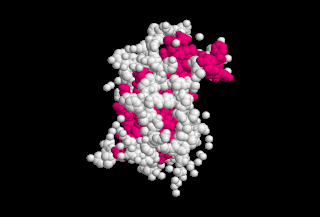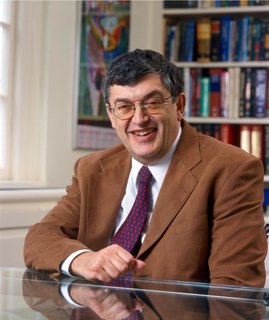
Endocrinology is a branch of biology and medicine dealing with the endocrine system, its diseases, and its specific secretions known as hormones. It is also concerned with the integration of developmental events proliferation, growth, and differentiation, and the psychological or behavioral activities of metabolism, growth and development, tissue function, sleep, digestion, respiration, excretion, mood, stress, lactation, movement, reproduction, and sensory perception caused by hormones. Specializations include behavioral endocrinology and comparative endocrinology.

Cushing's syndrome is a collection of signs and symptoms due to prolonged exposure to glucocorticoids such as cortisol. Signs and symptoms may include high blood pressure, abdominal obesity but with thin arms and legs, reddish stretch marks, a round red face, a fat lump between the shoulders, weak muscles, weak bones, acne, and fragile skin that heals poorly. Women may have more hair and irregular menstruation. Occasionally there may be changes in mood, headaches, and a chronic feeling of tiredness.

Growth hormone (GH) or somatotropin, also known as human growth hormone in its human form, is a peptide hormone that stimulates growth, cell reproduction, and cell regeneration in humans and other animals. It is thus important in human development. GH also stimulates production of IGF-1 and increases the concentration of glucose and free fatty acids. It is a type of mitogen which is specific only to the receptors on certain types of cells. GH is a 191-amino acid, single-chain polypeptide that is synthesized, stored and secreted by somatotropic cells within the lateral wings of the anterior pituitary gland.

Gigantism, also known as giantism, is a condition characterized by excessive growth and height significantly above average. In humans, this condition is caused by over-production of growth hormone in childhood, resulting in people 2.1 to 2.7 m in height.

Bernardo Alberto Houssay was an Argentine physiologist who, in 1947, was a co-recipient of a Nobel Prize for Physiology or Medicine for his discovery of the role played by pituitary hormones in regulating the amount of blood sugar (glucose) in animals. He was the first Argentine Nobel laureate in the sciences. He shared the prize with Carl Ferdinand Cori and Gerty Cori, who won for their discoveries regarding the role of glucose in carbohydrate metabolism).

Hyperprolactinaemia is the presence of abnormally high levels of prolactin in the blood. Normal levels average to about 13 ng/mL in women, and 5 ng/mL in men, with an upper normal limit of serum prolactin levels being 15-25 ng/mL for both. When the fasting levels of prolactin in blood exceed this upper limit, hyperprolactinemia is indicated.

Zollinger–Ellison syndrome is a disease in which tumors cause the stomach to produce too much acid, resulting in peptic ulcers. Symptoms include abdominal pain and diarrhea.

Pituitary adenomas are tumors that occur in the pituitary gland. Pituitary adenomas are generally divided into three categories dependent upon their biological functioning: benign adenoma, invasive adenoma, and carcinomas. Most adenomas are benign, approximately 35% are invasive and just 0.1% to 0.2% are carcinomas. Pituitary adenomas represent from 10% to 25% of all intracranial neoplasms and the estimated prevalence rate in the general population is approximately 17%.
Neuroendocrinology is the branch of biology which studies the interaction between the nervous system and the endocrine system; i.e. how the brain regulates the hormonal activity in the body. The nervous and endocrine systems often act together in a process called neuroendocrine integration, to regulate the physiological processes of the human body. Neuroendocrinology arose from the recognition that the brain, especially the hypothalamus, controls secretion of pituitary gland hormones, and has subsequently expanded to investigate numerous interconnections of the endocrine and nervous systems.
The Endocrine Society is a professional, international medical organization in the field of endocrinology and metabolism, founded in 1916 as The Association for the Study of Internal Secretions. The official name of the organization was changed to the Endocrine Society on January 1, 1952. It is a leading organization in the field and publishes four leading journals. It has more than 18,000 members from over 120 countries in medicine, molecular and cellular biology, biochemistry, physiology, genetics, immunology, education, industry, and allied health. The Society's mission is: "to advance excellence in endocrinology and promote its essential and integrative role in scientific discovery, medical practice, and human health."
Hypophysectomy is the surgical removal of the hypophysis. It is most commonly performed to treat tumors, especially craniopharyngioma tumors. Sometimes it is used to treat Cushing's syndrome due to pituitary adenoma or Simmond's disease It is also applied in neurosciences to understand the functioning of hypophysis. There are various ways a hypophysectomy can be carried out. These methods include transsphenoidal hypophysectomy, open craniotomy, and stereotactic radiosurgery.

Acromegaly is a disorder that results from excess growth hormone (GH) after the growth plates have closed. The initial symptom is typically enlargement of the hands and feet. There may also be an enlargement of the forehead, jaw, and nose. Other symptoms may include joint pain, thicker skin, deepening of the voice, headaches, and problems with vision. Complications of the disease may include type 2 diabetes, sleep apnea, and high blood pressure.

Dr. Hossein Gharib is a physician who specializes in thyroid disorders. He was born in Tehran, Iran, on February 2, 1940, and is a consulting physician at the Mayo Clinic in Rochester, Minnesota.

Eduardo Arzt is an Argentine molecular biologist, Master in Experimental Biology, Doctor (Ph.D) from the Faculty of Pharmacy and Biochemistry. Currently, he is a senior researcher at CONICET, distinguished professor of the Faculty of Natural Sciences of the University of Buenos Aires, External Scientific Member of the Max Planck Society (Germany) and director of the Biomedicine Research Institute of Buenos Aires – CONICET – Partner Institute of the Max Planck Society.

Evelyn M. Anderson was an American physiologist and biochemist, most known for her co-discovery of adrenocorticotropic hormone in 1934.

Michael O. Thorner is David C. Harrison Professor Emeritus of Internal Medicine at the University of Virginia specializing in endocrinology and metabolism. He was previously the chief of the division of endocrinology and metabolism and the chair of the department of internal medicine.
Peter Edward Fecci is an American neurosurgeon, professor and researcher. He is an Associate Professor of Neurosurgery, Pathology and Immunology at Duke University School of Medicine. He also serves as Director of the Duke Center for Brain and Spine Metastasis, Director of the Brain Tumor Immunotherapy Program, Residency Program Director, and Associate Deputy Director of the Preston Robert Tisch Brain Tumor Center at Duke.
Nelson M. Oyesiku is a Nigerian-born professor of neurosurgery. He serves as a vice chairman of neurological surgery and professor of Endocrinology at Emory School of Medicine. He also serves as the Director of the Neurosurgical residency program at the Emory School of Medicine and is the Director of Laboratory and Molecular Neurosurgery and Biotechnology at Emory School of Medicine.

Jung-Min Lee is a South Korean-American medical oncologist and physician-scientist focused on the early clinical drug development and translational studies of targeted agents in BRCA mutation-associated breast or ovarian cancer, high-grade epithelial ovarian cancer, and triple-negative breast cancer. She is a NIH Lasker Clinical Research Scholar and principal investigator in the Women's Malignancies Branch at the National Cancer Institute.
Endocrine & Metabolism Research Institute (EMRI) is one of Tehran University of Medical Sciences research institute and a pioneering institute with a mission to combine clinical care, research and education in diabetes, endocrine and metabolic diseases.













